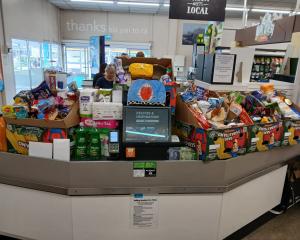
The boy was smack bang in the middle of the Ngāruawāhia rail bridge when the train driver first saw him.
The train, a middle-sized express freight, was 75-100 metres away, travelling at the speed limit of 60 km/h.
The driver, who spoke on the condition he not be named, pulled the brakes; the boy, 9-year-old Jayden Tepu, started to run.
But it was never, could never, be a fair race.
"We were gaining on him," the driver told the Weekend Herald this week, after 11-year-old Moareen Rameka was struck and killed by a train on the same bridge six days ago.
Sixteen years ago, when the Auckland-based driver and Jayden's lives criss-crossed in tragic circumstances, he could do nothing but watch and will.
"Going through my head, I'm willing him to jump into the river. He was fully clothed, so he wasn't a bridge jumper. But I'm willing him in my head to jump into the river, take his chances there.
"But as I gained on him, he was on the last span of the bridge and he tripped and fell. He fell face first and he never got up again. We went over the top of him."
The train would not stop until the Waingaro Rd level crossing, about 100m south, he said.
There the driver told his two companions, one a prospective new train driver, to stay put, climbed out of the cab and began walking towards the seventh wagon.
A witness was looking underneath; the train driver, the train ballast crunching beneath his boots, was "hoping against hope" for a miracle.
But miracles are in short supply when heavy, fast-moving metal meets human frailty.
Jayden was dead.
The driver called his train controller and supported himself against a fence as a large crowd gathered - the Ngāruawāhia regatta, a 122-year-old annual celebration of the Waikato River and community, was on.
He watched as police arrived, and later as they led a couple to the seventh wagon and lifted a tarpaulin draped over it by the fire service.
"I was feeling quite vulnerable because there's a bit of a crowd there and you don't know what the mood is … somebody's been killed and I'm there on my own.
"I get a tap on the shoulder from behind and it's the man and the lady [who looked under the tarpaulin]. Perhaps I had a look of apprehension on my face, [because] he said to me 'It's all good, there's no animosity. I'm the stepfather, this is the mother'.
"So I met the mum and dad there while their son was still under the wagon. It was pretty hard, but it was all good - we hugged and I met them again at the Coroner's Court at Huntly."
A week later he was back in the driver's cab and wondering how he would feel, especially the first time he crossed the rail bridge.
But it was ok.
Jayden wasn't the first person he'd struck and killed during his 43 year career, nor was the little boy the last.
"The first time after the incident, when I approached the bridge … I thought, 'How am I going to react?'
"Really, it was ok … because it wasn't my first one. The first one is the one where you run through all the 'what ifs'. 'What if I was a minute earlier, what if I was a minute late, it wouldn't have happened'.
"But then you reconcile that it was fate."
That first one was in 1980.
He was driving a passenger train at Remuera when a drunk man toppled down an embankment and under the passing train. After giving a statement to police, the driver finished his shift.
"It's different now, you get support."
The last was in 2015, when his train and a truck collided at a level crossing in Rangiri, killing the truck driver.
Other drivers have spoken of locking eyes with vehicle occupants in the instant before impact, but the size of the truck caused him to duck down in case debris came through the window.
His three fatalities were by no means unusual among his peers - some had had more, the driver said.
"Some people have chucked the job in because they couldn't handle having one fatality. Some have had multiple and ... it's just got too much."
He watched one driver's legs give way under him after a fatality.
In his own life he had not worn a wristwatch since the one he was wearing during the 1980 fatality stopped at the exact moment of the tragedy.
"The watch is still in the drawer unworn since then, it's still stuck on 7.10. I know it's there but I don't go near it."
He coped by talking about what had happened, especially with peers who "tread the same path", the driver said.

"Yes, it happened, I have to acknowledge that. But i don't think about it every day. That's not to say it goes away, it'll never go away until I close my eyes forever."
He hoped sharing his story would help people take rail safety seriously.
"If the public could see what we see, the aftermath of what a train does to a human body … it's not going to come out very good.
"At the very least [you'll] probably be badly injured, maimed. At the worst, closed casket. And who wants to go in a way where their relatives can't see them for the last time because it's just too horrible?"
A father and grandfather, his own family had heard his advice around the railways - unless you're catching a train, stay away.
"Those moving, rolling stock, they've got no friends. They'll kill you and they'll kill me and I've been around them 44 years now, but they'll kill me just as easily if I let my guard down.
"So they don't have any friends whatsoever. And they've got no conscience. They'll do the deed on anyone."












